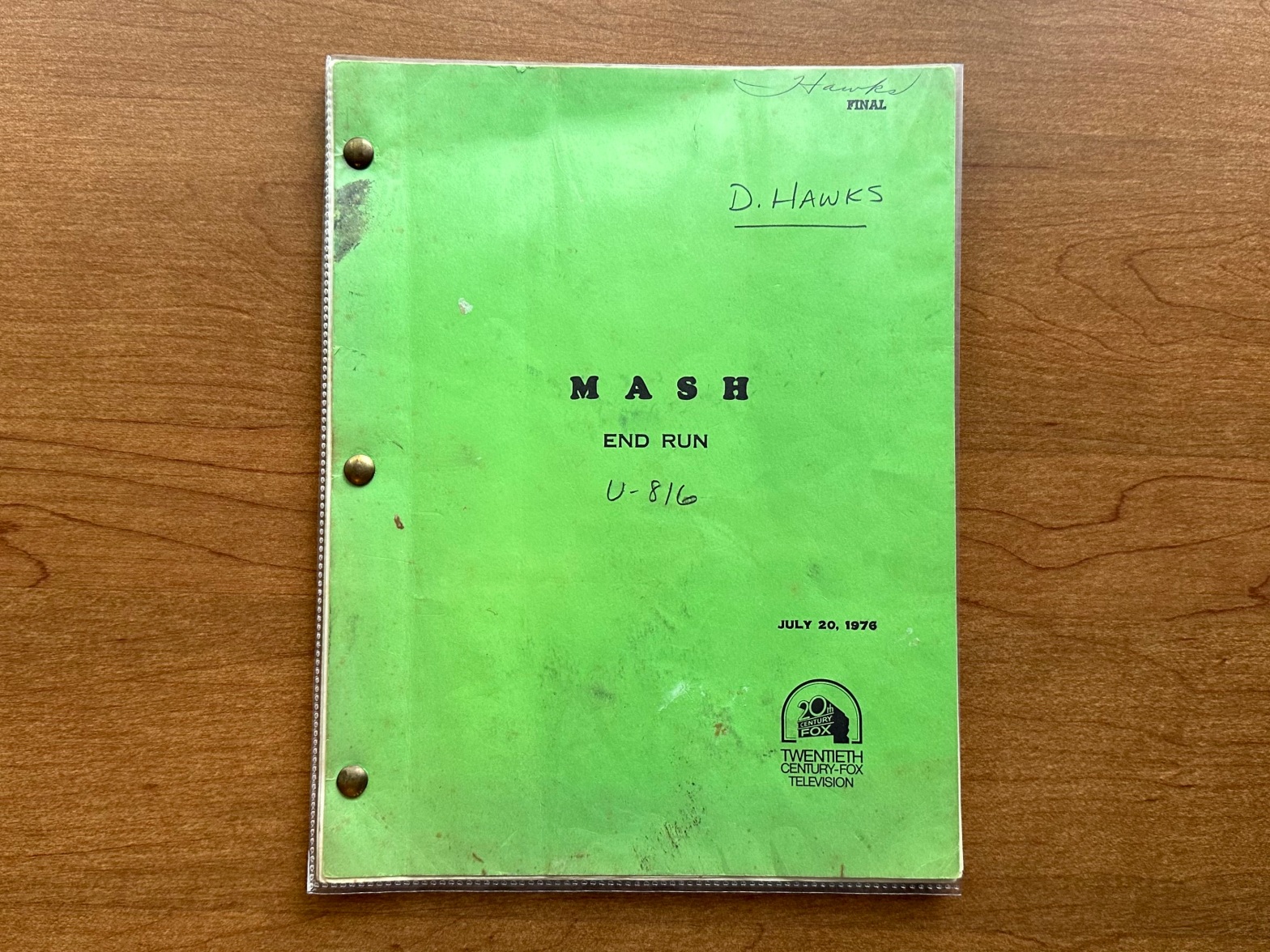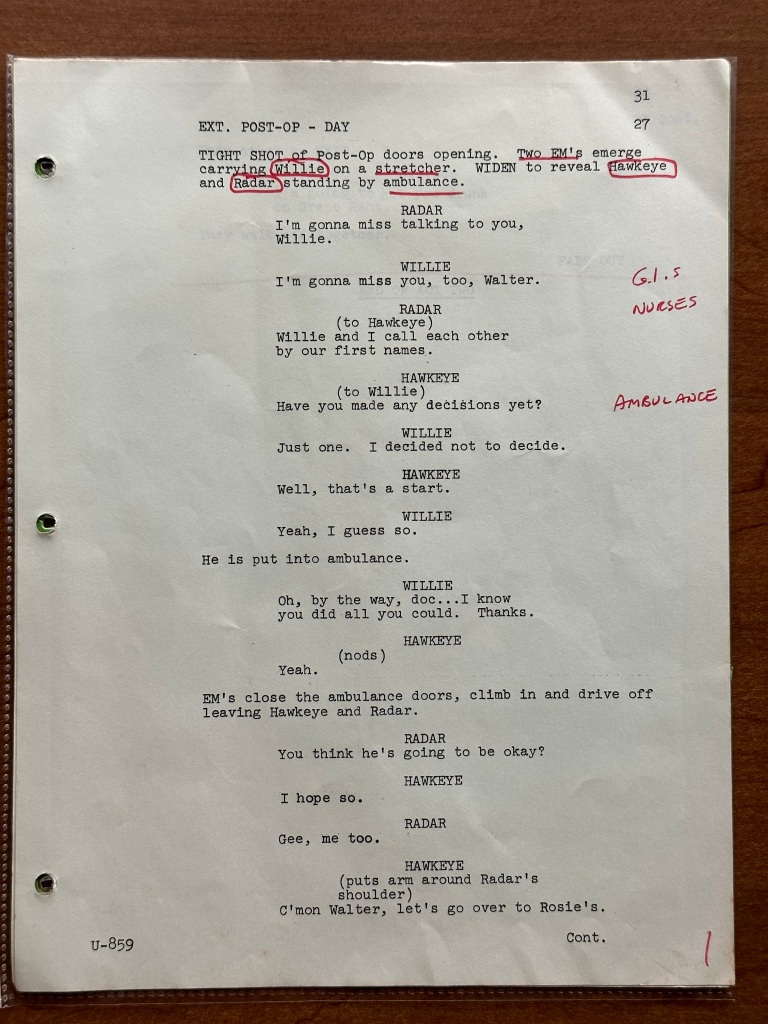Flipping through my archive for a script to review this week, I ran across this script for the episode “End Run” (05 x 17). I was intrigued by the name on the cover, but initially, the neon green cover is what caught my attention! As I began to research the script and then rewatch the episode, I found that this is an under appreciated episode. The primary storyline with the soldier losing his leg was an unfortunate reality of war, and watching him come to terms with what that meant for his life back home was very moving. As I looked at the script and starting researching, I found even more interesting material about the director and writers. Let’s begin by looking closer at the script.
The Script

This script is labeled a “Final” draft and is dated July 20, 1976. The episode was written by John D. Hess and Don Reo and Alan Katz. Hess is credited with writing two other episodes in seasons three and four. However, Reo and Katz were a major part of the M*A*S*H production team. Reo is credited with writing two other episodes, and Katz is credited for two others as well. Both Reo and Katz are credited as producers for the entirety of season five. Both went on to have long careers producing in television, and Katz was interviewed on the M*A*S*H Matters podcast in 2022.
The bright green cover has a handwritten name on it, “D. Hawks.” This is David Hawks, the assistant director of the episode. Like Katz and Reo, he held his position for all of season five. This episode was directed by Harry Morgan, so while he would have been responsible for calling the shots throughout the four day production, Hawks was there to work with him. Each season, directors would come and go, but having the same assistant director for the entire season must have helped with constancy in the series. Hawks made extensive notes throughout the script in red ink. He notes when special effects are need, when stunt doubles are needed, extras, background actors, and even had a note calling for the helicopter, pilot, and the dummies to go in the helicopter pods. The level of detail that Hawks was seemingly responsible for is extensive. And he was very thorough.
Sadly, this script does not have any other production documents such as shooting schedules and call sheets. Nor does it have any of the revised pages. But I really doesn’t need it. The amount of handwritten notes throughout the 34 page script is enough to keep any M*A*S*H fan interested. As I read through it, I learned several things about how the series was made including that they used dummies in the helicopter pods. That makes sense though since that would be safer and cheaper than hiring stuntmen to pull off the shot. Hawks marked up his script with what was important to him and his job. This script illustrates how vital one person could be to the production of the series. Yes, it took hundreds of people to make M*A*S*H work week to week, but the director and assistant director ran the show.
The Final Episode
Rewatching these episodes to write these posts has made me appreciate the series even more. Season five is when M*A*S*H was balancing drama and comedy at its best, and this episode illustrates that well. Billy Tyler, a well known college football running back, is wounded and brought to the 4077th. He has a leg injury, and just before he is put under, he tells Hawkeye and BJ, “…please…if you can’t save the leg, don’t save me.” The line is so well delivered and it is heartbreaking. But it sets us up for what happens next. Hawkeye and BJ are unable to save his leg, so as Tyler confronts his new reality, he struggles. Radar is able to help him see things from a different perspective, and he leaves the 4077th more optimistic about his future despite his injury. This is one of the storylines that made M*A*S*H great.
To balance the dramatic storyline, the second story begins with a fight in Rosie’s Bar. Zale does not happy that Klinger isn’t fighting along side the others from the 4077th. They later get into a food fight in the mess tent which is broken up by Margaret. Frank then arranges for Klinger and Zale to fight it out the next afternoon, despite fighting being against military regulations. Hawkeye intervenes and makes Klinger and Zale realized that they have been played by Frank, so they work out an alternate resolution to their fight, and we get to see Frank get punched instead. The scene where Klinger and Zale hit Frank and the same time is classic!
This script didn’t have any revised pages, but there were some revisions between this draft and what we see on screen. The first major difference is the name of the character “Billy Tyler” was originally “Willie Wade.” Aside from the other minor line differences, there are a few other major changes. The first is that the fight scene in Rosie’s had more dialogue (page 2). The food fight scene between Klinger and Zale in the mess tent was actually shorter in this draft and took place in the serving line (page 14). The food fight at the table is far more entertaining, so I am glad that changed! The scene when Billy finds out his leg was amputated is different, and the end of act 1 was moved in relation to this scene (page 18). Finally, the scene in which Radar shows Billy the coverage of his football game in Life magazine isn’t in the script at all. As a result, the final scene where Billy is loaded into the ambulance is different since he does not say anything about going for the “short pass” (page 31).
This episode illustrates for me what made M*A*S*H great. We see a wounded soldier coming to terms with the horrific wound he suffered. Being wounded, experiencing “phantom pain” for a leg that wasn’t there, and him grieving the loss of his leg is a powerful statement. That was well balanced by the storyline of the fight between Klinger and Zale. By season five, M*A*S*H was well established and could explore these deeper topics, and that is why the series continues to pass the test of time.


















